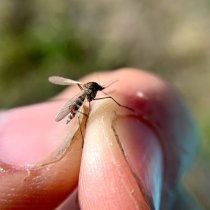Data Notification
Update: Survey Results and Pilot Study - Planned changes to mosquito pathogen status data product (DP1.10041.001)
March 26, 2025
This is an update to the previous post regarding planned changes to mosquito pathogen status data product (DP1.10041.001).
NEON received over 30 responses to the mosquito pathogen survey in the spring of 2024 from a range of early to late career scientists working across academia, the government and non-profits. The survey aimed for community feedback on preferred updates to the mosquito pathogen testing methodology given the low pathogen prevalence over the last 10 years of data (e.g., 57 West Nile virus detections from more than 1,000,000 mosquitoes tested). More than 2/3 of respondents preferred a non-targeted RNA sequencing approach to explore the mosquito virome, rather than continuing to use PCR testing for an extremely rare subset of human-infectious pathogens.
This shift in methodology was approved in October 2024 and NEON will begin a pilot study on a subset of mosquito samples to test out sequencing, bioinformatics and data return procedures. Once protocols are finalized, mosquito samples collected in 2023-2024 will be analyzed using the new RNA sequencing methods. The data will enable discovery of new viruses and facilitate research into the ecological drivers of the mosquito virome which influence survival and transmission competence of mosquitoes.
To balance the dual goals of elucidating the community dynamics of the mosquito virome, and virus discovery, NEON will allocate the majority of samples across a temporally consistent set of mosquito species. Species will be selected from a subset of currently tested vectors, as well as other mosquito taxa that are widespread (i.e., occurring across numerous sites) and abundant (i.e., > 5000 individuals collected per year). An additional minority (~10%) of samples will come from a variably selected subset of rarer mosquito species to facilitate discovery of novel viruses.
After the initial pilot, approximately 425 samples per year are expected to be sequenced. These 425 samples will be allocated across the 47 terrestrial NEON sites such that 3 samples from each of 3 species are expected to be sequenced at each site over the course of each field season. Samples will consist of pools of 3 individual mosquitoes from the same species and bout of collection. Small pools of 3 individuals balances the cost-effectiveness of sequencing more individual mosquitoes with the need to maintain adequate depth and coverage of rarer viruses to preserve the capacity to detect the signal of their presence in a sample.
Results from an initial pilot study of 9 samples are expected to be returned by June of 2025. Data for the RNA sequencing of the full set of mosquito samples from the 2023 and 2024 field seasons would be expected to follow, likely by the end of 2025.
Please use the Contact Us form for further inquiries; please include the term "mosquito pathogen changes" in the body of your request.
